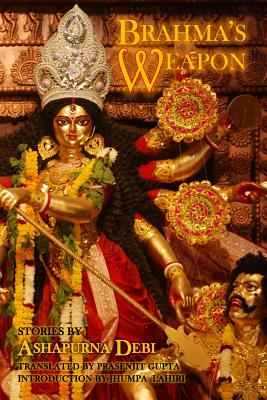Brahma's Weapon: Stories

Brahma's Weapon: Stories
Each of the twenty-one stories in Brahma's Weapon, carefully selected from the great writer Ashapurna Debi's extensive oeuvre and brilliantly translated from Bengali, highlights the tensions inherent in a society of close-knit and interdependent families. Focusing on the charged relationships between men and women, Ashapurna illuminates every facet of her heroes' lives with the light of her intellect, insight, and compassion. And her hero is the Bengali woman, in many ways the everywoman of a changing world, powerless yet powerful, challenged at every turn yet challenging the world of men, fighting back, spirited, indomitable. In "Poddolota's Dream," the title character returns triumphant and magnanimous to the scene of a harrowing childhood; it is only at the very end of the story that we find out exactly where her triumph lies. In "Glass Beads Diamonds," a woman attends a wedding reception at her estranged in-laws', bearing a gift for the bride; and such is the author's skill that without being told we know how much that gift has cost the giver. In "Grieving for Oneself," told from a man's point of view, a midnight scare shows the protagonist, immobile in his bed, precisely how he fits into his world, this world he's worked his life to build. It is, as in so many of Ashapurna's stories, a compelling insight, natural and shocking, terrible and human. Ashapurna is one of those rare writers able to render the voice of an entire culture, to capture its deepest and most abiding traditions indelibly, as also its revealing moments; to bring forth an entire society fully formed and unforgettable. Her created world is Bengal, her creature the Bengali woman within the Bengali family, her creation all the ebb and flow of the Bengali woman's universe, a world cartwheeling through the stars, dancing among the eternal truths. Her hero is this woman, this middle-class warrior, among her husband and children, among her sisters and neighbors, tight in this web of attachment, utterly indispensable yet utterly alone, reaching for understanding, for sustenance. But she is the provider, not the provided for. She is the sustainer, not the sustained. The characters at the center of these stories pay a price for their knowledge; but it is the price we all pay, as we live our lives, in measures of disappointment, grief, anger-lit by moments of laughter and connection. It is Ashapurna's triumph, her gift of diamonds to the reader, that she shows us all of this in the compress
PRP: 154.61 Lei
Acesta este Prețul Recomandat de Producător. Prețul de vânzare al produsului este afișat mai jos.
123.69Lei
123.69Lei
154.61 LeiIndisponibil
Descrierea produsului
Each of the twenty-one stories in Brahma's Weapon, carefully selected from the great writer Ashapurna Debi's extensive oeuvre and brilliantly translated from Bengali, highlights the tensions inherent in a society of close-knit and interdependent families. Focusing on the charged relationships between men and women, Ashapurna illuminates every facet of her heroes' lives with the light of her intellect, insight, and compassion. And her hero is the Bengali woman, in many ways the everywoman of a changing world, powerless yet powerful, challenged at every turn yet challenging the world of men, fighting back, spirited, indomitable. In "Poddolota's Dream," the title character returns triumphant and magnanimous to the scene of a harrowing childhood; it is only at the very end of the story that we find out exactly where her triumph lies. In "Glass Beads Diamonds," a woman attends a wedding reception at her estranged in-laws', bearing a gift for the bride; and such is the author's skill that without being told we know how much that gift has cost the giver. In "Grieving for Oneself," told from a man's point of view, a midnight scare shows the protagonist, immobile in his bed, precisely how he fits into his world, this world he's worked his life to build. It is, as in so many of Ashapurna's stories, a compelling insight, natural and shocking, terrible and human. Ashapurna is one of those rare writers able to render the voice of an entire culture, to capture its deepest and most abiding traditions indelibly, as also its revealing moments; to bring forth an entire society fully formed and unforgettable. Her created world is Bengal, her creature the Bengali woman within the Bengali family, her creation all the ebb and flow of the Bengali woman's universe, a world cartwheeling through the stars, dancing among the eternal truths. Her hero is this woman, this middle-class warrior, among her husband and children, among her sisters and neighbors, tight in this web of attachment, utterly indispensable yet utterly alone, reaching for understanding, for sustenance. But she is the provider, not the provided for. She is the sustainer, not the sustained. The characters at the center of these stories pay a price for their knowledge; but it is the price we all pay, as we live our lives, in measures of disappointment, grief, anger-lit by moments of laughter and connection. It is Ashapurna's triumph, her gift of diamonds to the reader, that she shows us all of this in the compress
Detaliile produsului










